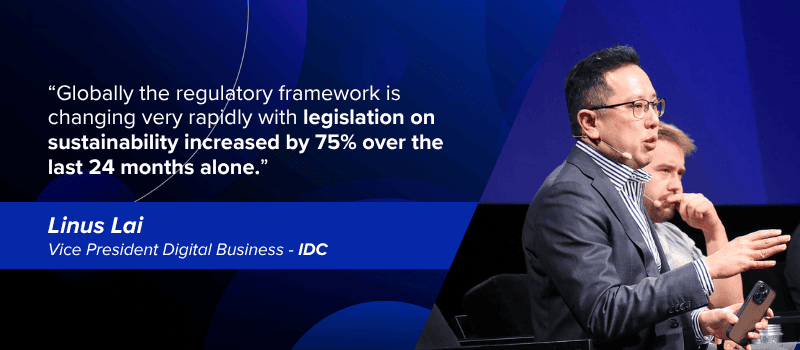
ESG: More Than Just Good Intentions
Forget everything you thought you knew about ESG being just a tick-box exercise. At the 2024 New Zealand CIO Summit, a powerhouse panel of leaders from infrastructure, the private sector, and local government ripped up the old rulebook. They showed how Environmental, Social, and Governance (ESG) principles are rapidly transforming from mere compliance into a core driver of business strategy, deeply woven into long-term objectives and powered by genuine stakeholder engagement.
The panelists were:
Anthony Thompson, Sustainability Manager and Te Ao Māori Strategy Lead, Co-Chairman of Te Rōpū Māori o SkyCity, SkyCity Entertainment Group
Anthony Thompson, Sustainability Manager and Te Ao Māori Strategy Lead, Co-Chairman of Te Rōpū Māori o SkyCity, SkyCity Entertainment Group
Linus Lai, Chief Analyst – ANZ, IDC Australia (Australia)
Grace de Leon, City Initiatives Lead, Smart Christchurch
Mitchell Pham, Board Member, NZTech
Mary-Elizabeth Tuck, Chief Sustainability & Master Planning Officer, Auckland Airport
From Compliance to Competitive Advantage: The Shifting Landscape of ESG
The discussion emphasised that ESG is evolving beyond mere regulatory adherence to unlock tangible value. For exporters, this means confronting new regulations like the European Union's upcoming Carbon Border Adjustment Mechanism (CBAM, which requires businesses to prove their carbon footprint across supply chains. NZTech Board Member Mitchell Pham highlighted this as an "immediate business imperative."
SkyCity Entertainment Group is proactively turning mandatory climate-related disclosures into a strategic advantage. Anthony Thompson, Sustainability Manager and Te Ao Māori Strategy Lead, explained, "What's missing in a lot of ESG strategies is long-term planning. It's not a traditional 3 to 5 year business strategy, but targets aligned to 2050." SkyCity uses climate scenarios to forecast how climate issues will impact major infrastructure, ensuring funding for future asset replacements. This demonstrates how ESG is being embedded into financial planning for long-term resilience.
Smart Christchurch is showcasing how smart city ESG initiatives deliver both regulatory compliance and community benefits. Grace de Leon, City Initiatives Lead, cited fire detection sensors as an example: they offer "a sense of ease that if there is a fire we could actually detect it early." She also noted how traffic monitoring projects ease congestion and improve the environment, stressing that building a culture of sustainability requires proactive public engagement.
The Ripple Effect: Accountability Across the Supply Chain
A significant challenge highlighted was the increasing importance of third-party risk. Businesses are now responsible not only for their own practices but also for those of their vendors and suppliers.
Mary-Elizabeth Tuck, Chief Sustainability & Master Planning Officer at Auckland Airport, described the complex web of responsibilities with multiple tenants regarding safety and sustainability. As an ASX-listed company, Auckland Airport adheres to Australia's Modern Slavery Act, embedding its requirements into procurement. A powerful example of ESG influencing investment decisions was their choice of a more expensive solar panel supplier to guarantee ethical sourcing.
From a council perspective, Grace de Leon noted that extensive procurement manuals aren't enough; engagement is crucial. "Our procurement manual is about 150 pages but to be able to better engage our suppliers for ESG… they need to understand what the journey is," she observed. She is also championing a greater focus on the social aspects of ESG, encouraging vendors to demonstrate how their operations genuinely benefit and reinvest in the local community.
Some forward-thinking enterprises, like SkyCity, are even leveraging sustainability platforms to assess suppliers against key sustainability metrics. These platforms provide scorecards that not only measure performance but also educate suppliers, offering a vital baseline understanding and ideas for progression.
“ESG has always ranked in the top three in IDC's studies with regards to CEO's priorities across the world.”
- Linus Lai
ESG: From Obligation to Unbounded Opportunity
The clear message from the summit was that ESG is no longer a peripheral concern. It's a fundamental lens through which long-term planning, investment, procurement, and innovation are viewed. By fostering strong partnerships with stakeholders—from suppliers to the wider community—operational challenges can be transformed into opportunities, leading to stronger future resilience and profoundly positive outcomes for everyone.
This engaging discussion from the 2024 New Zealand CIO Summit merely scratched the surface of ESG's transformative power. To continue this vital conversation and gain deeper insights into the evolving landscape of technology leadership, don't miss the 2025 New Zealand CIO Summit!
Be sure to look out for sessions on "The CIO Agenda - The future of the IT industry" (9:25 AM), "The geopolitical and economic update: The current economic trading conditions and its implications for technology" (11:30 AM), and the "Panel: The AI use case: Supporting business objectives and strategic AI adoption" (1:30 PM, Day 2), all of which will build upon the foundation of operationalising strategic value. We look forward to welcoming you there to connect, collaborate, and innovate for a more sustainable and resilient future.
Join a powerful dialogue between global thought leaders and local experts at the New Zealand CIO Summit & Awards.
19-20 August | Viaduct Event Centre, Auckland
